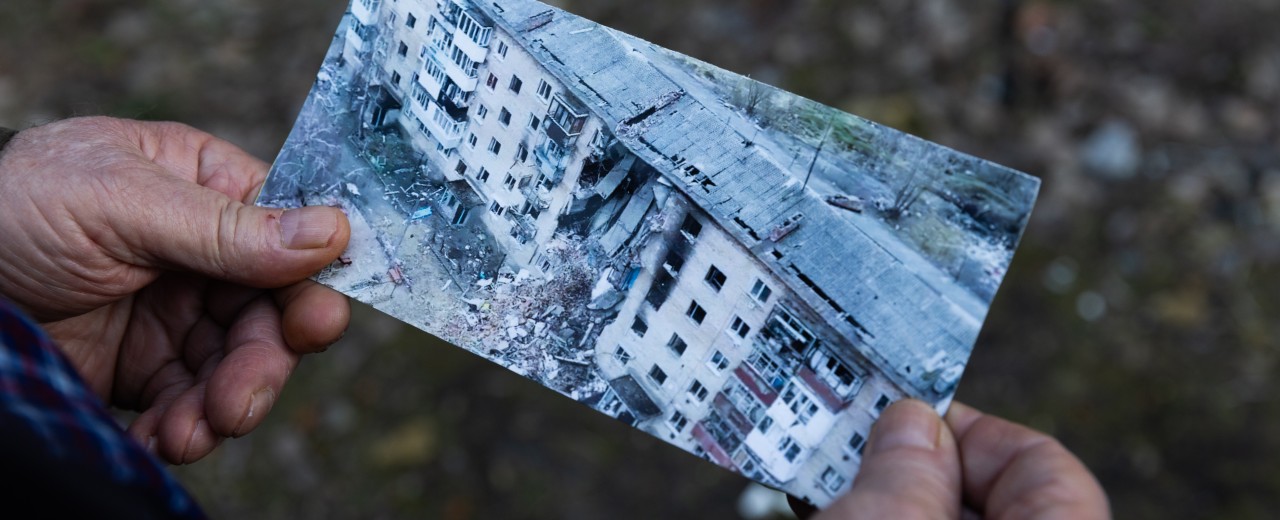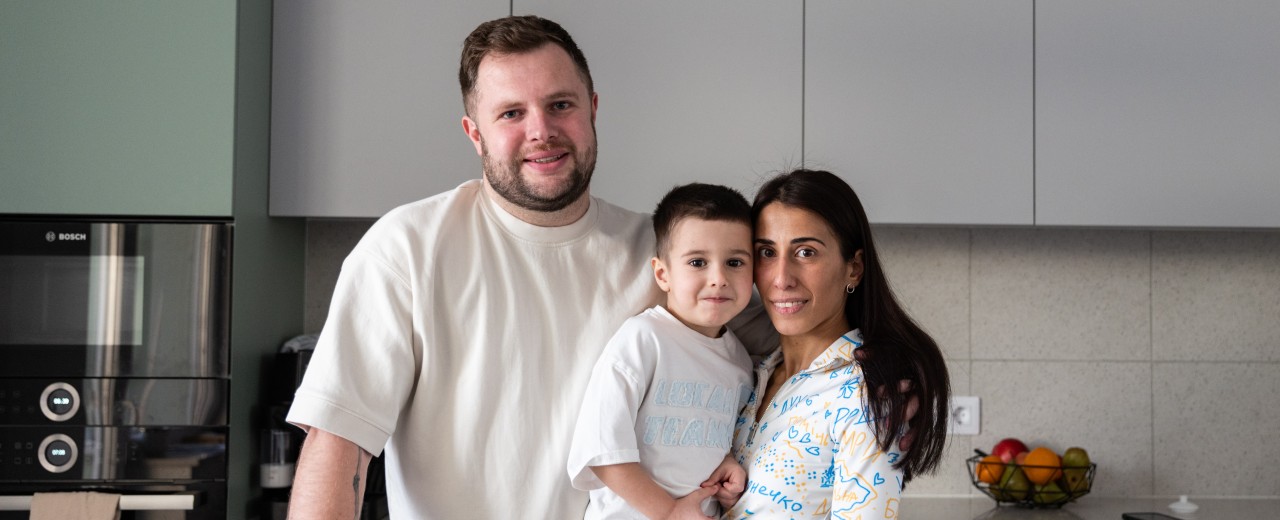Tip: Activate javascript to be able to use all functions of our website
Russia’s war against Ukraine, which has been ongoing since 2022, is presenting the country with major challenges. Almost four million people are currently refugees within Ukraine and in urgent need of new housing. However, there is often a lack of housing in the host communities. They are unable to provide adequate, affordable accommodation in many locations. Therefore, KfW, commissioned by the German Federal Government, is supporting Ukraine in creating housing for internally displaced persons with more than EUR 170 million.
The Russian war of aggression on Ukraine presents the municipalities with major challenges. For example (as of February 2024), almost four million people are refugees within Ukraine – at the start of the war, there were even more than seven million. They seek refuge in areas less affected by attacks and destruction. This includes many people who have already been displaced several times, for example after the Russian attacks on East Ukraine in 2014.
According to estimates of the Rapid Damage Needs Assessment 3, which was jointly prepared by the Ukrainian government, the World Bank, the European Commission and the United Nations, the cost of restoration and reconstruction is currently USD 486 billion / EUR 440 billion – 2.5 times Ukraine’s actual GDP in 2023. The need for housing is particularly high: around 10% of Ukraine’s total housing stock is damaged or destroyed by the consequences of war, and millions of Ukrainians are looking for new housing. Housing is the most pressing issue at the moment, especially for internally displaced persons. However, even those who did not have to flee are often in a precarious housing situation, as many buildings were already in need of renovation before the war. Due to a wave of privatisation in the early 1990s, little municipal and social housing is available, and the current legal situation makes relevant reforms of the housing sector (e.g. lease-purchase options) more difficult. The existing financing requirement for sufficient housing significantly exceeds the possibilities of the state and municipalities.

KfW can look back on long-standing cooperation with Ukraine in the housing sector. Since 2014, it has been supporting the country with funds from the German Federal Government to create housing capacities. The focus is on internally displaced persons and returning people. However, the residents of host communities also benefit from the measures, as the municipalities have the opportunity to make part of the created housing space available to them. On the other hand, the pressure on the housing market decreases as a whole. KfW also pursues an approach in which the creation of housing (if possible) is supplemented by the provision of social infrastructure such as kindergartens or health stations. The combination contributes to improving the living conditions of the local population as a whole. Energy efficiency is another characteristic of KfW’s approach. When rehabilitating and constructing new buildings, particular emphasis is placed on making the buildings heat- and cold-resistant and thus reducing vulnerability for the future as well. This is not only important with regard to CO2 savings, but also saves energy, which is a particularly scarce asset in Ukraine.
KfW is currently financing four programmes in Ukraine with different government and non-governmental agencies. Since not all internally displaced persons have the same (especially financial) opportunities, these programmes offer different options based on their respective needs.
KfW’s ongoing projects in the housing sector in Ukraine currently amount to around EUR 170 million. These are only grants.
On behalf of the Federal Ministry for Economic Cooperation and Development (BMZ), KfW has been working with the project-executing agency Ukrainian Social Investment Fund (USIF), a non-profit organization, for 10 years to promote housing for internally displaced persons. Existing apartments for internally displaced families – so far for 1,000 people – are being rehabilitated in an energy-efficient manner. Other sites are currently being modernised to create housing for 800 internally displaced persons. As the availability of housing suitable for rehabilitation is decreasing, the option of constructing new buildings will also be examined in the future in order to alleviate the housing need.
The International Organization for Migration (IOM) creates additional housing for internally displaced persons by repairing or converting existing properties. In addition, there is cost-efficient new construction option in a prefabricated module design. The target group is internally displaced people in need, who initially gain access to social housing in the regions of Kyiv, Lviv, Chernivtsi, Winnytsia and Ivano-Frankivsk. The finished properties are to be handed over to municipal ownership and sponsorship and rented out as “affordable housing”.
This generates revenue that the municipalities are to use for further construction or conversion projects. This has the potential to lead to the gradual build-up and expansion of a stock of social housing in the long term (revolving fund concept). In a further phase, the commitment will be expanded geographically. In total, the intent of the programme is to create up to 2,400 housing units for internally displaced persons and returning people. In addition, the project is significantly engaged in policy dialogue to strengthen options for social and affordable housing at the municipal level, which are only possible to a limited extent in the current legal situation.
The international non-governmental organization Norwegian Refugee Council (NRC) supports people affected by the war by building, repairing and rebuilding small-scale infrastructure in the areas of energy, water and wastewater, as well as complementary social services. The priority is living space. The project also offers legal assistance on matters relating to housing, land and property rights. 1,500 people will benefit from the renovation of housing, and nearly 10,000 people will also benefit from the improvement of municipal infrastructure.

Since 2016, KfW has supported the awarding of loans for the purchase of housing at reduced interest rates through the State Fund for Support of Youth Housing Construction (SFYH) on behalf of the Federal Ministry for Economic Cooperation and Development (BMZ). The target group is internally displaced persons with sufficient creditworthiness; the participants in the creditworthiness check are determined by lot. So far, 660 loans have been granted. It is a revolving fund, i.e. interest and repayments from borrowers can be used for new loans to other internally displaced persons. The project was increased in 2023, as the need for housing loans among internally displaced people is still very high. In addition, the prices of homes in regions considered safe are constantly rising. Private home ownership promotes social integration and, at the same time, represents an important pillar of private provision in old age due to the lack of government-backed social insurance systems.
Through the aforementioned programmes and approaches, a total of more than 9,000 people are expected to benefit from the creation and rehabilitation of affordable housing, the majority of whom are internally displaced. In addition, 660 loans have already been granted for financing housing, which corresponds to around 2,000 people.
Share page
To share the content of this page with your network, click on one of the icons below.
Note on data protection: When you share content, your personal data is transferred to the selected network.
Data protection
Alternatively, you can also copy the short link: https://www.kfw-entwicklungsbank.de/s/enzBzcch
Copy link Link copied